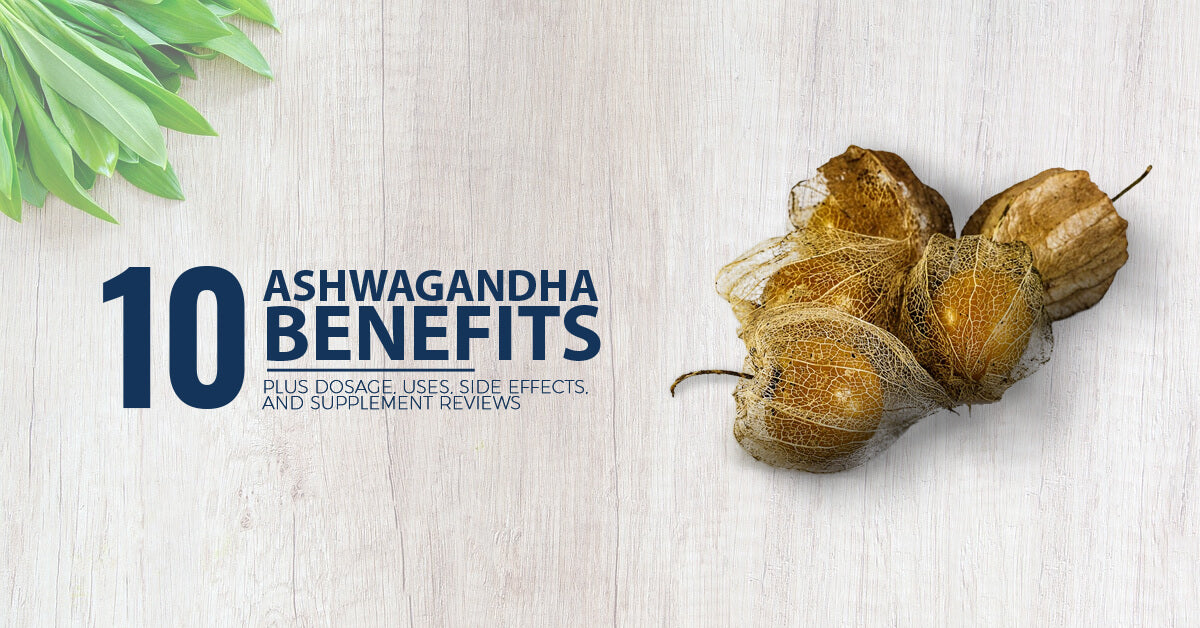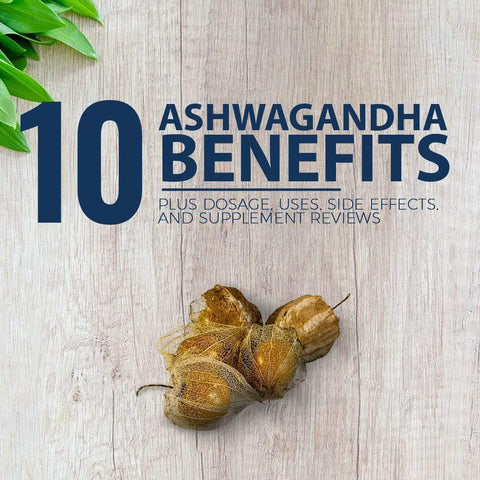
Ashwagandha is an Indian herb best known for its adaptogenic effects. And what exactly does adaptogenic mean? Just what it sounds like, actually.
Adaptogenic herbs, or adaptogens as they’re often called, help us adapt to stress. Ashwagandha (also known as withania somnifera) is probably the most well known adaptogen there is. Read on to find out more about this herb that has been used in both traditional medicine and modern science.
How does ashwagandha work?
The magic ingredients in ashwagandha are called withanolides.
Withanolides have been scientifically proven to have both anti-inflammatory and antioxidant properties. But ashwagandha doesn’t just have a role in modern-day medicine. It has been used in Ayurvedic medicine for thousands of years.
According to Ayurvedic practitioners, ashwagandha has “rasayana” properties. This means that it helps to protect the body against disease and damaging external factors.1
It also helps to slow the aging process and to improve overall physical and mental health. So ashwagandha works from not only a physical standpoint, but also on an energetic level.
10 Benefits of Ashwagandha

Ashwagandha has such a wide array of benefits that it was hard to narrow them down to just 10. Here are some of the most common uses of this special herb. 1
- Improves thyroid function
- Increases immunity
- Helps to adapt to stress and reduces anxiety
- Helps with adrenal fatigue
- Improves depression
- Improves sexual function
- Improves fertility
- Balances blood sugar
- Increases muscle strength
- Improves brain health
Exclusive Bonus! Download the FREE report ‘5 Top Supplement for Optimum Health’ by clicking here.
Possible Ashwagandha Side Effects
Though ashwagandha is a generally safe herb, there are a few potential side effects to watch out for. They are mostly of a digestive nature, and consist of vomiting, diarrhea, and upset stomach. 1
Another potential side effect is that ashwagandha can lead to miscarriage, and so it should not be taken during pregnancy. It shouldn’t be taken while breastfeeding either because there isn’t much evidence to support its safety in lactation. 1
You should also stay away from ashwagandha if you’re on medication for high blood pressure, diabetes, autoimmune conditions, or hypothyroidism. 1 Ashwagandha can also potentially worsen symptoms of certain autoimmune conditions, like multiple sclerosis, rheumatoid arthritis, and lupus. Since ashwagandha can affect the brain and spinal cord, it can lead to some adverse effects if taken too close to any surgery that involves anesthesia, 1 and so, it should be stopped a minimum of two weeks prior to any procedures that require anesthesia.
What dose should I take?

Ashwagandha is usually taken in capsule, powder, or liquid form. It can be taken as is, or by mixing the powder in with other food or drink. It’s often recommended that ashwagandha powder be mixed in with energy balls, smoothies, or even lattes. The root and the leaves have medicinal properties, and the extract of either of these plant parts can be used.
When looking at different products, you’ll want to read the label and make sure that the withanolide content is somewhere between 1% and 10%.1 A higher content usually means a more therapeutic effect. A typical dose of ashwagandha is between 1 and 1.5 grams, though some studies have determined that 6 grams a day is the target dose. 1
When to Take Ashwagandha
One of the most common conditions in which ashwagandha is used is adrenal fatigue. If you’re feeling stressed, overwhelmed, or completely burnt out, ashwagandha may be able to help. You may also want to take it if you suffer from anxiety or depression.
If you have been diagnosed with pre-diabetes or diabetes, you may want to take ashwagandha to help balance your blood sugar, but not if you are taking any diabetes medication. If you would like to improve your concentration and focus at school or work, you could take ashwagandha to help improve memory and academic performance. If you find you often get colds or the flu, then ashwagandha could be helpful to boost your immune system, and you may want to take it once flu season comes around.
If you are an athlete gearing up for your sporting season or a big competition, then ashwagandha can help improve your performance. If you’re not a high-level athlete but simply feel like you’ve hit a plateau at the gym, then ashwagandha may be a good choice for you as well.
If you have an underactive thyroid, then this herb may be helpful, but only start on ashwagandha under the supervision of a health care practitioner to lower your chances of experiencing any adverse effects. If you are having any problems with fertility or sexual dysfunction, you may want to give ashwagandha a try.
Ashwagandha Studies

Ashwagandha is fairly well studied in the literature. One recent study from 2017 looked at ashwagandha in adults with mild cognitive impairment. They gave participants 300 mg twice a day for eight weeks.2 They found improved immediate and general memory. Participants were able to better sustain their attention and process information more quickly compared to those not taking ashwagandha.
A different study looked at ashwagandha in females for an eight-week period. They found that this herb helped to improve sexual dysfunction in the participants, even though they were generally healthy.3 In a completely different study, 300 mg were given to young males twice a day for eight weeks. These were young males without much experience in resistance training. By the end of the eight-week study, they found that the participants had increased muscle mass and strength.4 This study concluded that ashwagandha might be good to use in conjunction with a resistance training program.
Best Ashwagandha Supplements
Herb Pharm Ashwagandha Whole Root 
This product is derived from pure, whole ashwagandha root. It contains a good dose of 626 mg per serving. It’s certified USDA organic, non-GMO, and gluten-free. It’s harvested in the fall and carefully dried out in the shade. The purpose of this is to make sure it keeps its full color and smell. It is then thoroughly extracted in order to get the most bioactive compounds t possible.
Gaia Herbs, Single Herbs Ashwagandha Root 
This product is a concentrated extract that contains 2700 mg of dried herb equivalent per capsule. This company guarantees their levels of withanolides, and this product is alcohol-free, dairy-free, and gluten-free. It’s also distilled in liquid, meaning that it’s easily absorbed by the body. These capsules are free of heavy metals and are lab tested for peace of mind. The capsule used is plant-derived and, therefore, nice and easy to digest.
Savesta Stress, Stamina, Brain Function 
This product is standardized to 5% withanolides, which falls right within the 1-10% we like to see in ashwagandha products. This product is free of soy, wheat, gluten, and GMOs. It is laboratory verified for both potency and purity. It even comes in a bottle that is guaranteed to be free of BPAs.
Final Thoughts
The different uses and benefits of ashwagandha are numerous and diverse. Chances are you could use some of this special herb in your life. Check with your health care practitioner today to see if ashwagandha is right for you.











